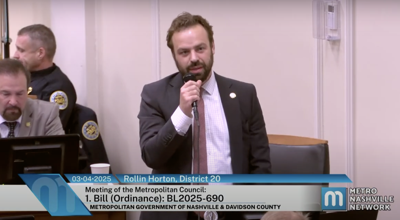The long-debated Fusus camera network bill passed on its second of three readings at Tuesday night’s Metro Council meeting, tacking on four additional amendments.
The proposed legislation would add guardrails to Fusus, a video integration system that would allow the Metro Nashville Police Department to access businesses’ private security footage with the owner’s consent when calls for service come in.
Split Metro Council rejects video integration technology by one vote despite plea from mayor
One of the approved amendments Tuesday would require any police officer accessing camera footage to document the time, date, circumstance and reason for access and require an independent firm to conduct audits of the officer records. The amendment also stated the camera network could not use facial-recognition technology, AI or machine learning to identify individuals or “capture conversations through automated lip reading.”
Other amendments would prohibit the MNPD from accessing live video from donor cameras on solely residential properties and donor cameras at multifamily residential properties that monitor areas other than parking lots, parking garages or outdoor common areas.
An additional amendment would require any video collected by the camera network that shows an MNPD employee exercising excessive or unlawful force to be preserved and provided to the MNPD Office of Professional Accountability and the district attorney general.
District 27 Councilmember Bob Nash expressed his support for the latter amendment and for the camera network as a whole.
“I rise in support of this amendment for the same reason that I support body cameras on police officers,” Nash said. “Video evidence can be very important in determining exactly what happened and who did what, and I think these cameras provide that same level of important video testimony. ... Like DNA evidence, this can easily clear people as much as it can help apprehend them.”
District 16 Councilmember Ginny Welsch has adamantly opposed the Fusus camera network over the past several months and continued to speak against it Tuesday night, pushing for the council to defer consideration of the bill’s second reading until they could look over an official Fusus contract.
Mayor, a longtime police skeptic, now favors video surveillance tool as it heads toward a council compromise
“I feel like with Fusus as with so many other surveillance systems, we have one shot to get it right,” Welsch said. “One shot, and if we miss — we are all going to pay a price for that going forward.”
With a vote from the council, Welsch’s push to defer consideration failed.
The divisive legislation, which failed by one vote last year, has received continued support from Mayor Freddie O’Connell, who told the Scene this week that the Fusus system does not create or store data.
“It is very different from license plate readers, and I worry that there has been a conflation of the two,” O’Connell said. “It's not sitting there with a running log of real-time video capture that gets stored in a giant database. It takes an existing surveillance resource and merely makes it more available to local law enforcement to resolve crimes.”
This article was first published by our sister publication, the Nashville Post.






